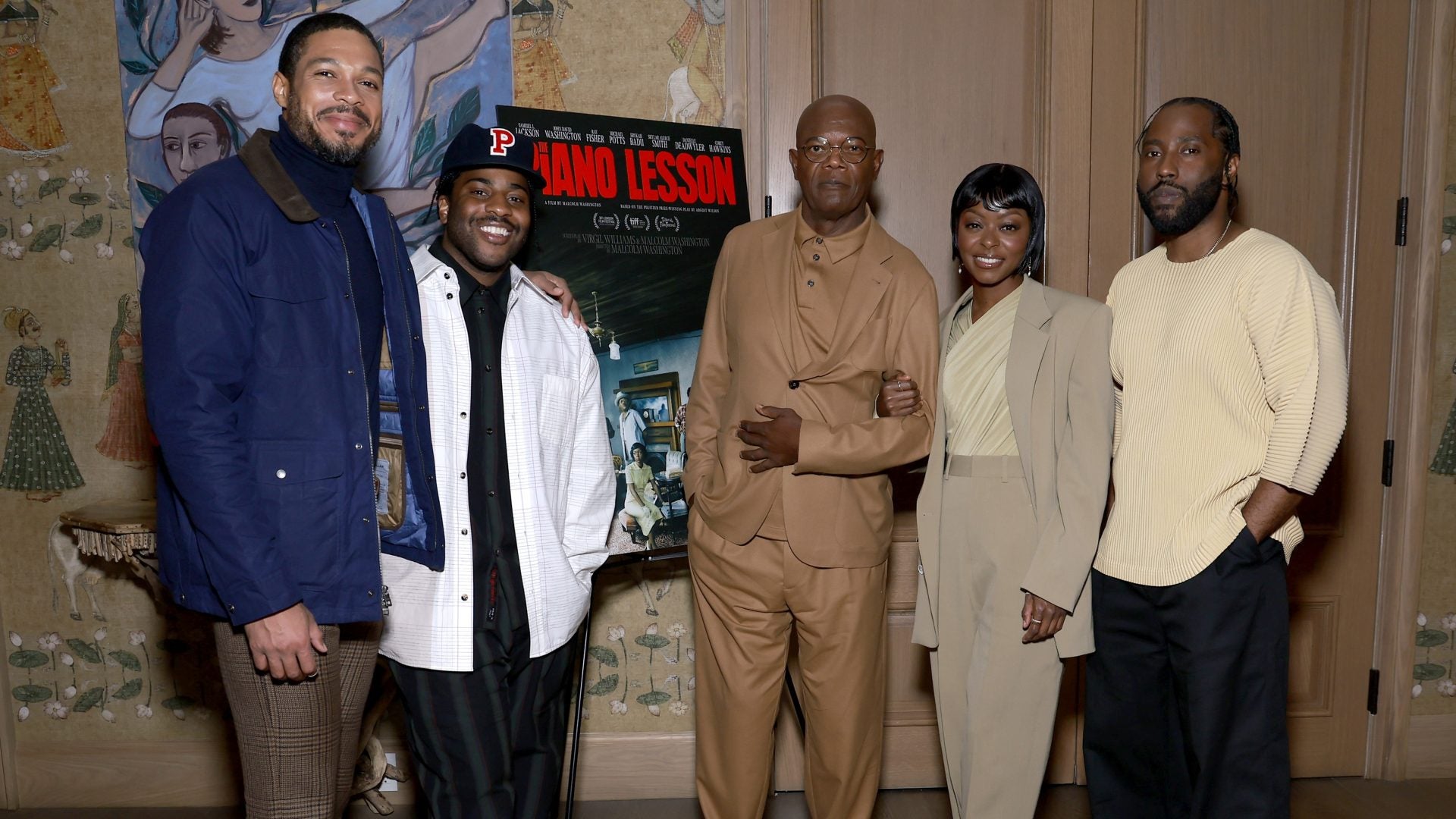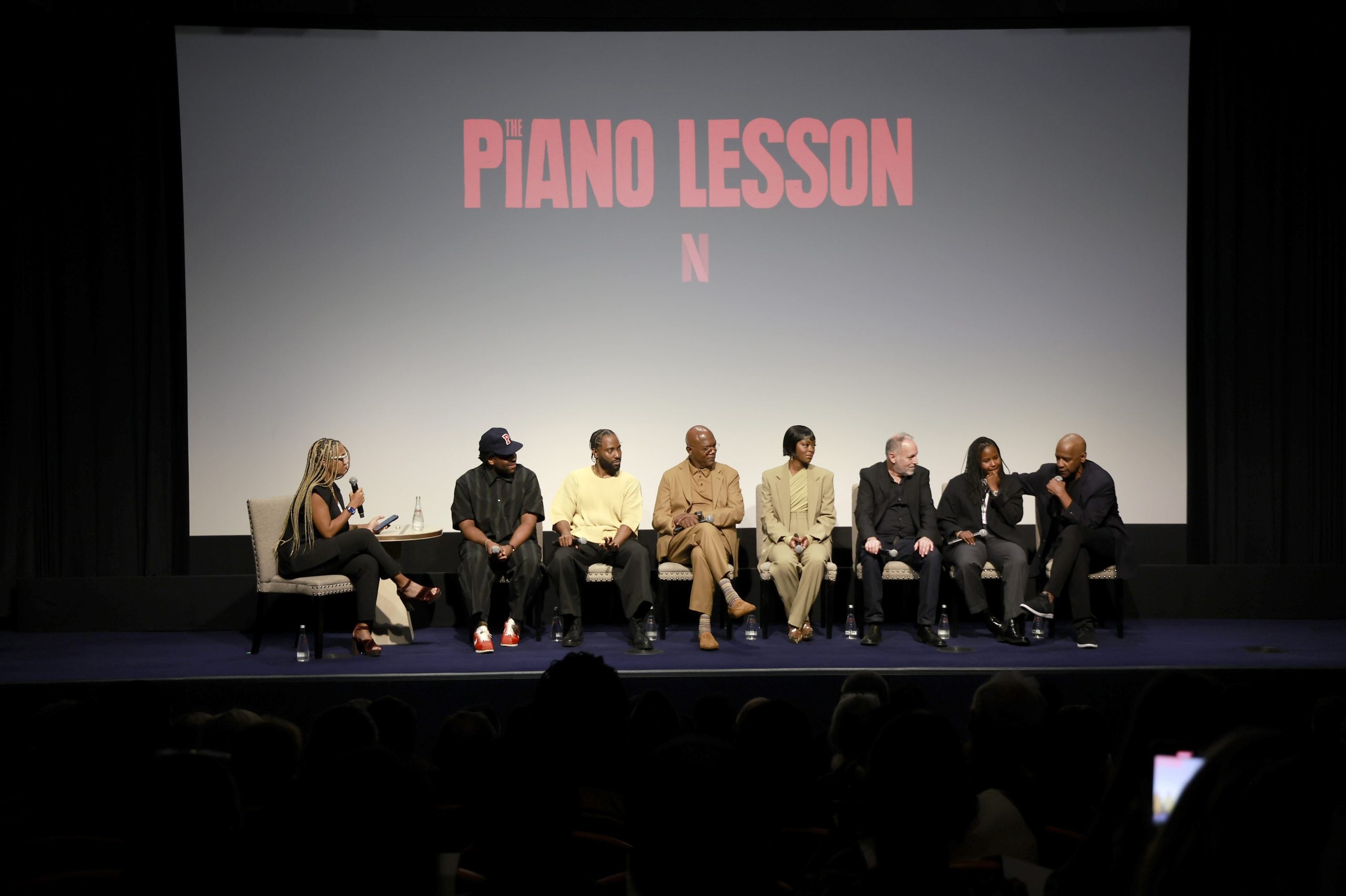
Filmmaker Malcolm Washington and the cast of Netflix’s The Piano Lesson—Samuel L. Jackson, Danielle Deadwyler, John David Washington dwells on the importance of family, collectively healing, and letting go of generational fears.
Washington’s historic film adaptation of August Wilson’s The Piano Lesson has become a cinematic family affair. Releasing in theaters on November 8 and on Netflix on November 22, filmmaking is apparently an intrinsic gene within the DNA of the Washington family. Malcolm’s two-time Academy Award-winning father, Denzel Washington produced the film and starred his other son, John David. “My mom is a pianist,” first-time director Malcolm Washington tells ESSENCE. “She couldn’t play the piano for a long time. She had a strange relationship with the piano and that took on such a force in this story.”
In 1990, Wilson’s play, The Piano Lesson was awarded a Pulitzer Prize for its dramatized narrative of painting a realistically complicated portrait of Black American family life in Mississippi and Pittsburgh from 1911 to 1936 during the Jim Crow era. The successful 2022 Broadway iteration of Wilson’s work starred Jackson as “Doaker” and John David as “Boy Willie.”
“He was so generous,” John David shares of collaborating with Jackson who has played multiple roles of August Wilson’s characters. “He has 40 years of experience with this text alone.”

Jackson’s repertoire of characters in cinema tend to carry a palpable sense of weaponized masculinity and toughness. Doaker is very much the latter which adds depth to Jackson’s nuanced acting. From filling the shoes of “Boy Willie” in drama school at Yale in 1987 to playing the calm “Doaker” in 2022 on Broadway, Jackson’s return to The Piano Lesson gave him a brand new perspective to these harrowing characters. “You got to lose a lot of stuff when you go into adaptation work because you’re going outside of the original material and you’re expanding the scope of the script itself,” Jackson states. “People and places are going to coalesce as a whole and Willie is the engine that keeps this story going while Doaker is a steady spirit.”
Alongside, Jackson was the headstrong Deadwyler who inhabited the role of the cognizantly protective mother and daughter, Berniece. Her character makes it her life’s work to care for her family’s most cherished heirloom, the piano, that sat in their living room everyday. This piano was stolen from the Charles family by their ancestor’s slave owners, the Sutters. The instrument is a manifested vessel of blood, cultural, and generational heritage and knowledge that delineated the family’s lineage; despite living in a time that sought to erase their everyday existence. “When we were shooting the film, my mom came on set and I watched her play piano for the first time in years,” Washington recounts. “I hadn’t heard it since my youth and it brought everybody out and it was emotional.”
Music and Black spirituality have been intertwined for centuries and Wilson’s stark play reveals how collective trauma and refusal to confront fear can hinder a family’s healing. John David’s fiery portrayal of Willie showcases how chasing for opportunity doesn’t always equate to proper manhood and a fruitful legacy. Through his sibling conflicts with Berniece, the tension builds within the family household and this causes unforeseen horrifying spirits to linger and loom. “I think about stories and how stories are critical in maintaining intergenerational connectivity,” Deadwyler shares, sitting alongside John David. “I have a set of earrings from my grandmother and it is telling how a possession can share a folklore in the making of a family.”
When it comes to collaborating with esteemed Black performers who have illustrious careers onstage and onscreen, Deadwyler comes back to pure basics. “It’s an education,” Deadwyler describes of her craft. “Art is a spiritual undertaking. It’s a political and personal undertaking, and to do it with people who are serious makes it all feel real. Filmmaking is supposed to shift who you are and therein possibly shift others and create a rich conversation amongst the greater community.”
Growing up in Los Angeles, Malcolm Washington credits films like Friday and The Tree of Life for bestowing in him the artistic magnitude to tackle his first filmmaking project. His directorial debut is all about igniting conversation and letting emotions simmer until they reach a fever pitch. The Piano Lesson employs dialogue as a dynamic tool while managing to move viewers without a clear directive or resolution for the Charles family. He focuses on the character relationships that make an audience quake — “the material found me at a time when I most needed it and I’m grateful that it did,” Malcolm explains to me.
“Malcolm has such a clear vision,” John David says, while speaking on witnessing his brother’s first director’s gig. “He has always been a director I’m a fan of. It was an artist that I admire and someone that I’m ready for him to spread his wings… and he’s flying.”
While adapting The Piano Lesson from stage to film, the creative collaboration between Malcolm and his family knew they had to tackle the confrontational scenes surrounding grief, accepting loss, and familial uncertainty in a succinct manner. “My approach to the house where most of the film took place was to chase dynamism,” Malcolm elaborates on his directing techniques. “I really wanted a moving, roaming, dynamic camera that was speaking to the subtext of the scenes that could communicate what’s in between the lines, and sometimes work in opposition to the lines, something that presented a subjective experience of the film, and reaches to the character’s interiority.”
As much as the dialogue Wilson originally created was of high-value to the filmmaking, Malcolm focused on allowing his diversely-talented cast to take an adlib approach in order to stir up organic performances. “I wanted the cast to kind of find rhythms that feel good to us as a whole so we break past the kind of rigidity that sometimes a sacred work can have where you get so scared.”
In this case, the audience is able to follow the unraveling within the Charles family household as suspense builds once Berniece lays her fingers on the piano’s keys. Her and the piano are a tethered source and conduit for her family’s many invisible guardian angels — their ancestors. Earth, wind, fire, and water all possess a seasonal quality in The Piano Lesson because even though family and community dynamics may shift, nature will always persist, but what is most important is when everyone comes together.
When Boy Willie’s Dad is showing him the dirt and makes a note of it being land that can bear more,” Washington continues. “His father puts his hand on his back, and I remember when my dad used to do the same and put his gigantic hand on my little back.” This idyllic, simple scene is quintessential to the core story Malcom is framing which is for Black folks to be powerfully rooted and grounded in family despite turmoil and trouble. The full gathering of the Charles family at the final minutes of The Piano Lesson is the conflict, climax, and resolution — together they archive each other’s mere presence through memory. “I’ll never take for granted the love that is required to pour into a project. The dedication that is required from everybody, top to bottom,” Washington says.




